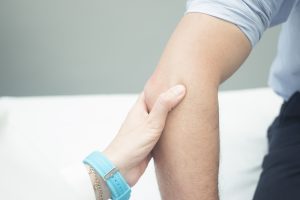
If you have been experiencing pain when gripping or arehaving weak wrist movement in general, it’s possible you are experiencing what is called golfer’s elbow. Golfer’s elbow is known medically as medial epicondylitis and can sometimes even be a form of chronic tendinitis. Golfer’s elbow is also commonly referred to as “thrower’s elbow.” It is caused by repeated forceful motions like throwing, lifting, or bending the wrist against a golf club improperly. Golfer’s elbow affects more than just golfers. Those of all occupations or recreational hobbies can be susceptible if they’re bending their elbow often, and not weight training correctly or taking the time to warm up.
Golfer’s elbow is easily confused with tennis elbow and is similar in that it is caused primarily from overuse. However, golfer’s elbow affects the inside of the elbow rather than the outside. Pain occurs at the point where the tendons of your forearm muscles meet the inner bone of your elbow. This results in “damage to the muscles and tendons that control your wrist and fingers.”
Golfer’s elbow can easily be prevented. If you are an avid golfer, golfer’s elbow surprisingly affects the trail arm of the swing more than the lead arm. It is often developed from golfers who tend to release their wrists too soon during their down swing. To help correct this issue, consider taking lessons to correct your form and avoid playing on poorly maintained courses that have too hard of grounds. A slower swing may even help reduce the amount of blunt force to the joint when hitting the ball.
Rest is key in treating golfer’s elbow.
It is imperative that you take a time out from any movement that may have caused the injury in the first place. Not refraining from physical activity will most likely prolong the healing process. Once you are healed, make sure to make a gradual re-entry to your normal activities.
Other self treatment methods include:
- Propping the elbow up in order to keep it elevated. This helps stimulate blood flow.
- Icing the area as much as four times a day for 20 minutes can also be beneficial. However, if this is a recurring problem heat therapy might be more conducive.
- Over the counter anti-inflammatory medicine can aid in relieving both pain and reducing inflammation. However, consulting with your healthcare provider is necessary before taking any medication. To reach a Kentucky orthopedic, feel free to contact Dr. Grossfeld at Orthopaedic Specialists at 502-212-2663
5 Treatments for Golfer’s Elbow
- Utilize a splint or brace. These can strengthen as well as protect the tendon and muscles affected; removing some of the strain and tension.
- Rehabilitation exercises such as squeezing a tennis ball, or doing wrist curls (curling a small weight from your fingers to your arms) can be effective at strengthening the forearm muscles.
- A deep tissue massage as part of an occupational therapy treatment plan can result in immense pain relief.
- Cortisone injections offer pain relief and reduce inflammation as well. However, they are not an effective long-term treatment option as many return too quickly to the activity that caused injury in the first place.
- Though platelet rich plasma (PRP) injection therapy is a relatively new concept, it has been shown to treat chronic tendon injuries quickly. PRP injections are non invasive. They involve drawing a small amount of blood from the patient, running it through the process of centrifugation, and then injecting it into the inflamed tissue. Dr. Stacie Grossfeld currently offers PRP injection therapy. Call 502-212-2663 today for more information or to schedule an appointment.
If not treated, golfer’s elbow can limit your range of motion and result in chronic pain.
While treatment for such an injury ranges from patient to patient, the recovery period is often a few weeks, with more severe cases taking months to heal. Dr. Stacie Grossfeld, an orthopedic surgeon and elbow specialist, in Louisville, Kentucky recommends seeking medical treatment as soon as the pain starts in order to avoid further damage and or chronic pain. In the rare case that you’ve torn the tendon you may need surgery to repair it.
If you are suffering from elbow pain or have recently injured one of your elbows, contact Dr. Stacie Grossfeld immediately. Dr. Grossfeld is a double board-certified orthopedic surgeon with a focus in sports medicine who routinely treats and repairs elbow injuries. Dr. Grossfeld can be reached at either of her two office locations in Louisville, Kentucky by calling 502-212-2663.

Recent Comments